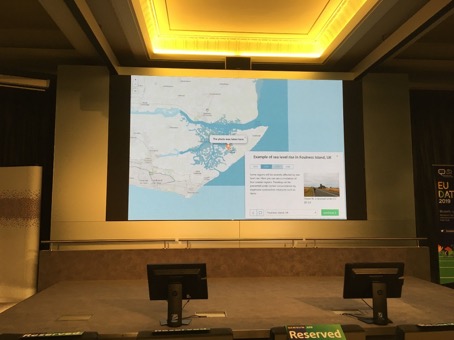“Tackling Climate Change” – FELD M at EU Datathon 2019 in Brussels

24.6.2019
Dr. Matthias Böck, Paul Schlumbom
Intro
As part of Data Science for Social Good, we not only offer our Data Ambulance for non-profit organizations but also regularly take part in hackathons, datathons, and similar competitions (R Conference, Kaggle, …). In 2019, we took part in the Europe-wide EU datathon for the first time and developed an application on the subject of climate protection.

The EU Datathon and our challenges
This year’s EU Datathon (https://publications.europa.eu/en/web/eudatathon) included three different challenges and we immediately knew that we wanted to deal with the topic “Tackling Climate Change”. The competition’s objective was, besides an innovative idea, the use of several open data sets provided by the different EU institutions. The evaluation was based on the following criteria, among others: Relevance, open data use (novelty, scalability, and updates), the solution itself (problem description, data science, maturity, ongoing benefits for the target group, sharability, …), and the project plan.
In addition to combating climate change, it is also important for us to point out the benefits of open data. Data transparency is one of the cornerstones of the Open Data movement and ensures integrity and scientific working methods as well as versatile use of the data. It is only through exploitation that data obtains its value, and the better the access, quality, and granularity of the data, the more detailed models and simulations can be built and their value-generating potential increased. Important sources include the EU Open Data Portal (https://data.europa.eu/euodp/en/data/), the UN (http://data.un.org/), and the World Bank (https://data.worldbank.org/).
An app against climate change – Data-based education for schoolchildren and young adults
Our idea: Education is our strongest weapon in the fight against climate change: understanding what the causes are, what effects it will have on our planet and what one can do against it. That’s why we wanted to explain climate change to students in a simple way, using vivid examples of soil, air, water, and biodiversity.
Greta Thunberg described the importance of education and why we need to act now most accurately:
Let’s get this application started: Our approach according to Design Thinking
With a small team, we have been developing our web-based app over the last few weeks, which aims to explain climate change to students on the one hand, but also to encourage them to become active themselves on the other.
In the implementation, we oriented ourselves on the Design Thinking Process and began by conducting interviews with our target group and experts as well as extensive desk research. We became aware that this project would of course focus on integrating data but to an even greater extent on curating suitable explanatory texts. Data literacy is certainly also an important aspect. How can we train our understanding of data and the interpretation of tables and visualizations? This is a recurring theme in our daily work with data.
Clarify with data: What our app shows exactly
Our analyses in our prototype combine data on EU-wide historical emissions of greenhouse gases and corresponding forecasts for the coming years. The shares of different sectors, but also the shares per capita and country in the total emissions are visualized. In addition to the extreme weather conditions observed in recent decades, we have also calculated how the sea would spread with predicted sea level rises by extrapolating sea level rise models onto the coasts of Europe.
For this purpose, Voronoi cells were calculated around the projection data points, and the sea levels were divided into bins and mapped onto a topographic map. In addition to the analyses, we have also collected various options on how to become active and what the current outlook is if we do not set ourselves more ambitious goals.
You can find our current prototype here (so far only developed for desktop and tablet): environ-mate.feld-m.de
Technical details and data protection
The application itself is client-based (no backend required) and therefore highly scalable (JS libraries such as Leaflet, Spectre, and Vue were used for this). Furthermore, the application is GDPR-compliant and available in German and English. We plan to add more languages in the coming weeks.
The result: Fourth place in our group at the EU-wide Datathon
From 99 EU-wide project ideas we were chosen to present our project in the finals in Brussels. Last week it finally happened and we presented our results together with 11 other teams (four per Challenge) in short 10-minute presentations. We took fourth place in our Challenge and would like to thank everyone for their positive and constructive feedback over the last weeks. The EU Datathon 2019 was well organized (in advance as well as the final conference).
Special thanks for the support goes to our colleagues who had our backs and supported us in implementing the project. At this point, we would also like to congratulate all the innovative project teams who put a lot of heart and soul into their projects!
Future ahead: How things will continue
We firmly believe that our app can deliver great added value for many people. Our project does not end with the datathon; we intend to carry out user tests with students and ask a climate expert for further input. In addition, we are looking for other comrades-in-arms who believe in the good cause and want to support us in our future development. Of course, we will also look for funding or sponsors for our concept. Just write to us at Datenambulanz@feld-m.de if that sounds exciting to you.

